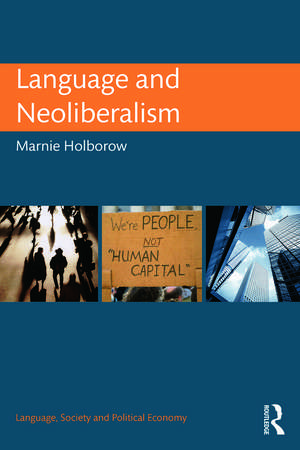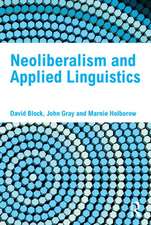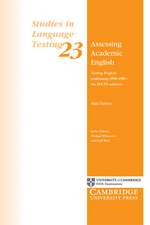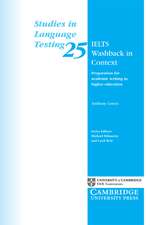Language and Neoliberalism: Language, Society and Political Economy
Autor Marnie Holborowen Limba Engleză Paperback – 3 mar 2015
In universities, it is now the norm to use terms like entrepreneurial and business partnerships. How have these terms become a core component of education and gained such force? Markets have become, metaphorically, a power in their own right. They now tell governments how to act and warn them against too much public spending. Post-crash, the capitalist market continues to be crisis-prone, and in that context the neoliberal ideology remains contested.
Free of jargon and assuming no specialist knowledge, this book will strike a chord internationally by showing how neoliberal ideology has, literally, gone global in language. Drawing on Vološinov and Bakhtin, Williams and Gramsci, and introducing concepts from Marxist political economy, Language and Neoliberalism is essential reading for all interested in the intersection of linguistics/applied linguistics and politics.
| Toate formatele și edițiile | Preț | Express |
|---|---|---|
| Paperback (1) | 440.21 lei 6-8 săpt. | |
| Taylor & Francis – 3 mar 2015 | 440.21 lei 6-8 săpt. | |
| Hardback (1) | 1216.38 lei 6-8 săpt. | |
| Taylor & Francis – 27 feb 2015 | 1216.38 lei 6-8 săpt. |
Din seria Language, Society and Political Economy
-
 Preț: 288.33 lei
Preț: 288.33 lei -
 Preț: 287.70 lei
Preț: 287.70 lei -
 Preț: 394.29 lei
Preț: 394.29 lei -
 Preț: 382.95 lei
Preț: 382.95 lei - 17%
 Preț: 258.89 lei
Preț: 258.89 lei -
 Preț: 351.11 lei
Preț: 351.11 lei -
 Preț: 389.66 lei
Preț: 389.66 lei
Preț: 440.21 lei
Nou
Puncte Express: 660
Preț estimativ în valută:
84.23€ • 88.18$ • 69.70£
84.23€ • 88.18$ • 69.70£
Carte tipărită la comandă
Livrare economică 05-19 aprilie
Preluare comenzi: 021 569.72.76
Specificații
ISBN-13: 9780415744560
ISBN-10: 0415744563
Pagini: 160
Ilustrații: black & white illustrations
Dimensiuni: 156 x 234 x 9 mm
Greutate: 0.24 kg
Ediția:1
Editura: Taylor & Francis
Colecția Routledge
Seria Language, Society and Political Economy
Locul publicării:Oxford, United Kingdom
ISBN-10: 0415744563
Pagini: 160
Ilustrații: black & white illustrations
Dimensiuni: 156 x 234 x 9 mm
Greutate: 0.24 kg
Ediția:1
Editura: Taylor & Francis
Colecția Routledge
Seria Language, Society and Political Economy
Locul publicării:Oxford, United Kingdom
Public țintă
Postgraduate and UndergraduateCuprins
Chapter 1. Introduction: Language and Neoliberalism: Issues and
Framework
Chapter 2. Neoliberalism and Language as a Commodity
Chapter 3. Markets, Metaphors and Neoliberal Ideology
Chapter 4. Language and the Market Metaphor
Chapter 5. The Neoliberal Invention of Entrepreneur
Chapter 6. Austerity, Entrepreneurship and the Neoliberal
University
Chapter 7. Conclusion: Implications for Understanding Ideology in
Language
Framework
Chapter 2. Neoliberalism and Language as a Commodity
Chapter 3. Markets, Metaphors and Neoliberal Ideology
Chapter 4. Language and the Market Metaphor
Chapter 5. The Neoliberal Invention of Entrepreneur
Chapter 6. Austerity, Entrepreneurship and the Neoliberal
University
Chapter 7. Conclusion: Implications for Understanding Ideology in
Language
Notă biografică
Marnie Holborow is a lecturer in the School of Applied Language and Intercultural Studies in Dublin City University, Ireland. She is a co-author of Neoliberalism and Applied Linguistics and has written widely on the presence of neoliberal ideology in language.
Recenzii
'An acute, imaginative piece of discourse analysis which reveals in tenacious detail just how deeply our language has been contaminated by the dehumanising idiom of the corporations' Terry Eagleton, University of Lancaster, UK
'Holborow raises the bar for studies of language and political economy. She applies subtle Marxist analyses to how keywords linked to markets and entrepreneurialism are shaping an ever-increasing number of spheres and activities. She provocatively asks when, how and if metaphors of market and commodity—including uses by critical scholars—challenge neoliberal ideologies. This book is a crucial read for applied linguists, sociolinguists, linguistic anthropologists, and anyone interested in the role of language in ideologies that justify or obscure or try to make commonsensical exploitative economic relations.' Bonnie McElhinny, University of Toronto, Canada
'...the book is a notable contribution to the study of neoliberalism as a political as well as an economic project, and its emphatic distinction ‘between the ideological representation of the world and … the real experience of class conflict’ (130) constitutes, amongst other forms of praxis, a crucial dimension of ‘the much needed challenge to neoliberalism’ (131) – a challenge that many of our more ‘fashionable’ theories are unable to present.' Liane Tanguay (University of Houston-Victoria) Key Words
'Holborow raises the bar for studies of language and political economy. She applies subtle Marxist analyses to how keywords linked to markets and entrepreneurialism are shaping an ever-increasing number of spheres and activities. She provocatively asks when, how and if metaphors of market and commodity—including uses by critical scholars—challenge neoliberal ideologies. This book is a crucial read for applied linguists, sociolinguists, linguistic anthropologists, and anyone interested in the role of language in ideologies that justify or obscure or try to make commonsensical exploitative economic relations.' Bonnie McElhinny, University of Toronto, Canada
'...the book is a notable contribution to the study of neoliberalism as a political as well as an economic project, and its emphatic distinction ‘between the ideological representation of the world and … the real experience of class conflict’ (130) constitutes, amongst other forms of praxis, a crucial dimension of ‘the much needed challenge to neoliberalism’ (131) – a challenge that many of our more ‘fashionable’ theories are unable to present.' Liane Tanguay (University of Houston-Victoria) Key Words
Descriere
Language and Neoliberalism examines the ways in which neoliberalism, or economic liberalism, finds expression in language. In this groundbreaking original study, Holborow shows at once the misleading character of ideological meaning and the underlying social reality from which that meaning emerges.
In universities, it is now the norm to use terms like entrepreneurial and business partnerships. How have these terms become a core component of education and gained such force? Markets have become, metaphorically, a power in their own right. They now tell governments how to act and warn them against too much public spending. Post-crash, the capitalist market continues to be crisis-prone and in that context the neoliberal ideology remains contested.
Free of jargon and assuming no specialist knowledge, this book will strike a chord internationally by showing how neoliberal ideology has, literally, gone global in language. Drawing on Vološinov and Bakhtin, Williams and Gramsci, and introducing concepts from Marxist political economy, Language and Neoliberalism is essential reading for all interested in the intersection of linguistics/ applied linguistics and politics.
In universities, it is now the norm to use terms like entrepreneurial and business partnerships. How have these terms become a core component of education and gained such force? Markets have become, metaphorically, a power in their own right. They now tell governments how to act and warn them against too much public spending. Post-crash, the capitalist market continues to be crisis-prone and in that context the neoliberal ideology remains contested.
Free of jargon and assuming no specialist knowledge, this book will strike a chord internationally by showing how neoliberal ideology has, literally, gone global in language. Drawing on Vološinov and Bakhtin, Williams and Gramsci, and introducing concepts from Marxist political economy, Language and Neoliberalism is essential reading for all interested in the intersection of linguistics/ applied linguistics and politics.

















